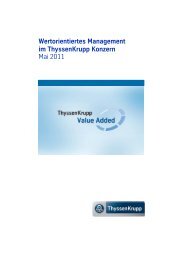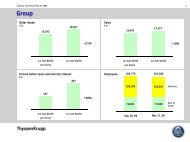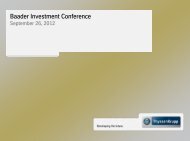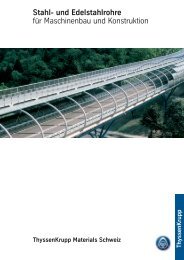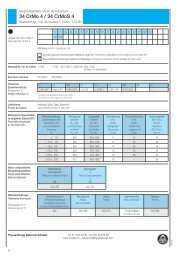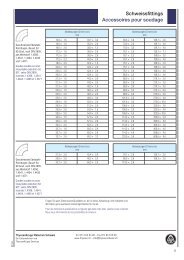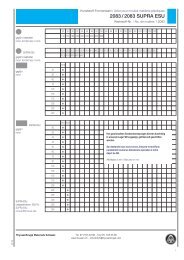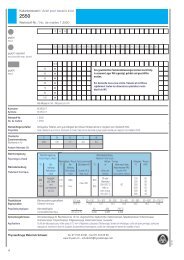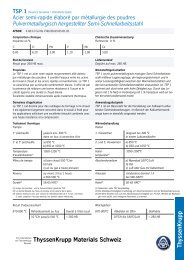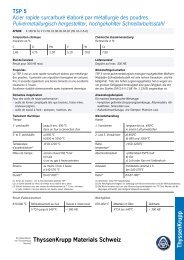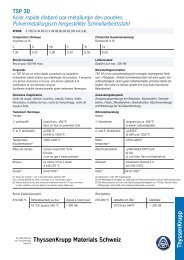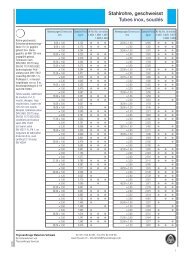Engineering
Engineering
Engineering
Create successful ePaper yourself
Turn your PDF publications into a flip-book with our unique Google optimized e-Paper software.
1.3 To our shareholders Corporate governance report report<br />
The performance bonus for for Executive Board<br />
members Board members is linked is to linked the performance to the<br />
indicators performance EBT indicators and ROCE. EBT and ROCE.<br />
Pages 54 54–55<br />
- 55<br />
Fixed compensation<br />
Since the last review at October 01, 2010, the fixed compensation for an ordinary Executive Board member<br />
has been €670,000 per year, paid out as non-performance-related basic compensation in monthly<br />
installments as a salary. The Executive Board members also receive benefits, mainly comprising the use of a<br />
company car, telephone as well as insurance premiums. Individual Executive Board members have to pay<br />
tax on these benefits as compensation components. The benefits apply in principle to all Executive Board<br />
members; the amount varies according to personal situation. The fixed compensation is generally reviewed<br />
every two years.<br />
Performance bonus<br />
The first element of the performance-related compensation is the performance bonus. In accordance with<br />
the performance bonus rules resolved by the Supervisory Board, the amount of the performance bonus is<br />
dependent on the Group’s EBT (earnings before taxes) and ROCE (return on capital employed), each of<br />
which is considered equally as a criterion. The performance bonus is therefore aligned with the performance<br />
indicators used in the Group. For example, if EBT is €2 billion and ROCE is 14.5%, the performance bonus is<br />
€1 million. A €100 million change in EBT or a change in ROCE by 0.5% points leads to a corresponding<br />
€25,000 change in the performance bonus. Individual performance can be recognized up to 20%.<br />
Extraordinary events are ignored in determining the performance bonus. The performance bonus is paid out<br />
to the individual Executive Board members two weeks after its establishment by the Supervisory Board. With<br />
a view to the Act on the Appropriateness of Management Board Compensation (VorstAG) the Supervisory<br />
Board determined that from fiscal year 2009/2010 a quarter of the performance bonus must be converted<br />
into ThyssenKrupp stock rights to be paid out after a three-year lock-up period. In view of the fact that EBIT<br />
is now used as a performance indicator in place of EBT, the Supervisory Board has decided to use EBIT<br />
instead of EBT alongside ROCE in an otherwise unchanged performance bonus system from fiscal year<br />
2011/12.<br />
LTI<br />
From fiscal year 2010/2011 a further compensation component is the LTI, a variable compensation<br />
component with a long-term incentive effect. In accordance with a resolution by the Supervisory Board, the<br />
MTI plan still applying for fiscal year 2009/2010 was modified and is being continued under the name Long<br />
Term Incentive plan – LTI. The LTI system is as follows:<br />
For a certain initial value, which for an ordinary Executive Board member amounts to €500,000, notional<br />
shares are granted. These so-called stock rights are not stock options. The number of stock rights issued to<br />
an Executive Board member is determined by the average stock price in the 1st quarter of the performance<br />
period. These stock rights are recognized as part of compensation at their value at grant date, calculated in<br />
accordance with international accounting standards. The number of stock rights issued under the LTI plan is<br />
then adjusted at the end of the respective three-year performance period. The basis for this is a comparison<br />
of average TKVA in the three-year performance period – beginning October 01 of the fiscal year in which the<br />
stock rights were granted – with the average TKVA of the previous three fiscal years. This compensation<br />
component therefore covers in total a period of six years. An increase in TKVA by €200 million results in a<br />
5% increase in stock rights; if average TKVA decreases by €200 million, the number of stock rights<br />
decreases by 10%. More information on TKVA is provided in the section “Value-based management”. At the<br />
end of the performance period the granted stock rights are paid out on the basis of ThyssenKrupp’s average<br />
share price in the first three months after the end of the performance period. Payments under the LTI plan<br />
are limited to €1.5 million for an ordinary Executive Board member.<br />
34




